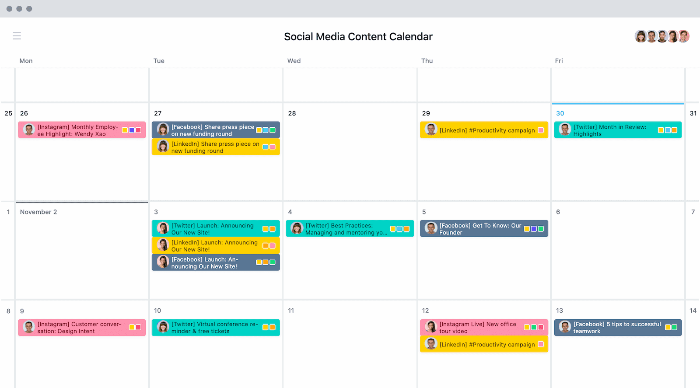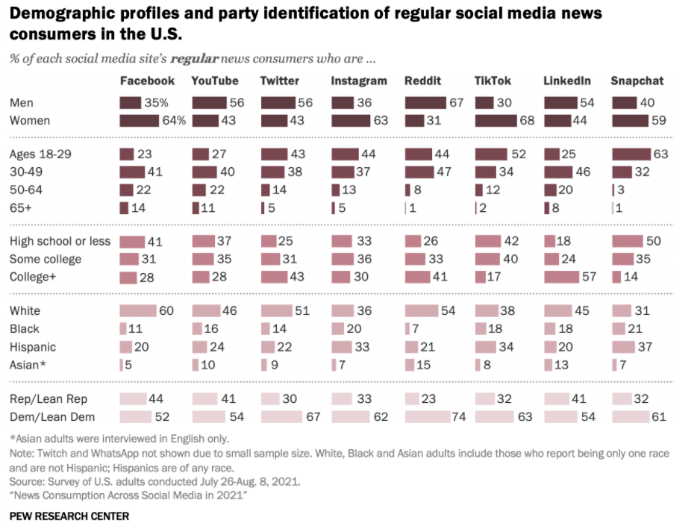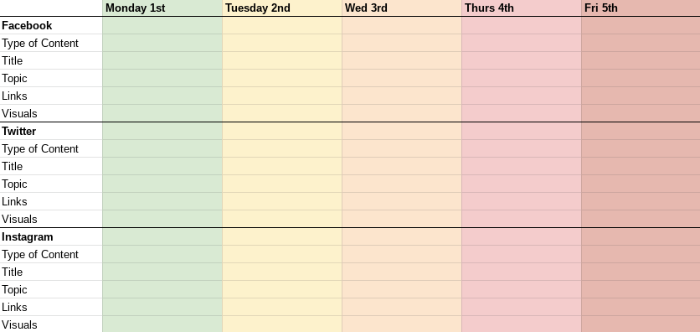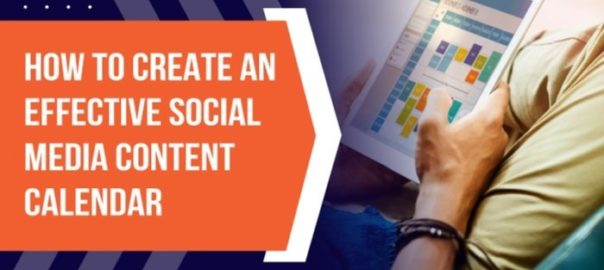Are you striving for consistency with your social media marketing? A good social media content calendar could be the missing ingredient.
Creating a social media calendar is a simple process, but it can have some impressive results.
Here’s how to quickly set up your social media content calendar and start leveling up your performance.
What Is a Social Media Content Calendar?
A social media calendar gives you a detailed overview of your upcoming social media posts.
This helps you to be more strategic with your content, maintain consistency, and delight your target audience on a regular basis.
Your social media calendar can be as simple as setting out what dates you’re going to post on, or it can be much more detailed.
Many successful social media content calendars will include high-level information to help you get more from each post:
- Platform: Facebook, Instagram, TikTok, or LinkedIn.
- Content-Type: Behind-the-scenes video, testimonial, product, etc.
- Date: Proposed schedule date.
- Time: Proposed schedule time.
- Title: The title of the post.
- Topic: What the post is about.
- URL: The URL of any links you will use.
- Visuals: A description of any visuals you want to use.
This information gives you an initial framework you can use to build out each post.
Be careful when you are planning, though.
There’s a clear distinction between a content calendar and a content plan. Generally, a content calendar will set out the dates and times for your posts, whereas a content plan will detail the strategies and topics you want to use for your social media marketing.
Since these ideas are closely related, they’re often referred to interchangeably—and can be incorporated into one document.
To give you a better idea of what to include, and where, take a look at this example of a content calendar:

By taking a strategic approach with your planning, you may find a social media content calendar helps you save time and be more effective with your social media marketing.
Why You Need a Social Media Calendar
Over 72 percent of the U.S. population use at least one social media platform, so your social media marketing is clearly important.
The question is, how does a social media calendar fit in?
Let’s take a look at two of the most important aspects of social media marketing: understanding your target audience and being consistent.
If you don’t understand where your target audience hangs out, what content they want to see, and how they consume information, then how do you expect to reach them? It’s difficult to connect with your audience when you’re making social media posts on the fly, which is why a social media content calendar can be so valuable.
The other thing that takes you a long way in social media marketing is consistency. It might not seem like it, but this one is actually very difficult to pull off. It’s not easy to keep coming back each day (or however often you post) with top-quality content.
It’s simply impossible unless you’re planning ahead.
Whatever niche you’re in, there’s tons of competition out there, so you need time to bring your ideas to life and make sure they’re perfectly targeted to your audience.
Those aren’t the only reasons to start using a social media content planner though. They can also help you:
- save time
- schedule posts
- reduce errors
- create more cohesive campaigns
- create a stronger brand identity
- run timely campaigns that fit with holidays and sales promotions
- track performance more accurately
The great thing is that anyone can start using a social media content calendar right now and use these benefits to improve their social media performance.
6 Steps to Create a Customized Social Media Content Calendar
You don’t need any fancy software to create an effective social media content plan. All you need to do is open a spreadsheet and follow these 6 steps.
Step 1: Review Your Social Media Goals
Before you create any plan, you need a clear idea of what you’re trying to achieve.
We all have some kind of goal for our social media posts, but it pays to narrow in on this and make them much more implicit. When you know exactly what you’re working towards, then it’s going to be much easier to come up with the content that’s going to help you achieve it.
Before you create your social media content calendar, make sure you sit down with your team and set yourself SMART goals (specific, measurable, achievable, relevant, and time-bound).
It’s also important to understand what KPIs you will use to measure your performance against these goals. For instance, are you most concerned with followers, impressions, clicks to your site, or something else?
Once you’ve got clearly defined goals, and a process for measuring your performance, then you’re ready to proceed.
Step 2: Audit Your Current Accounts
Now that you’ve got a clear picture of what success looks like, it’s time to find out how you’re currently performing.
This information is important because it’s going to serve as your baseline. Once you have this data, it’s much easier to test the changes you’re making and adjust your strategies accordingly.
You can add a sheet for all your KPIs to your social media content calendar to keep an eye on this and help make sure you’re constantly working to improve your processes.
Gather all relevant information and make sure it’s easily accessible:
- account details and passwords
- specific goals for each platform
- audience demographics
- responsibilities of each team member
- information on your most successful posts and campaigns
- areas for improvement, gaps in your content, poor results
- platform-specific KPIs to measure future success
This will require a little bit of hard work, but it’s well worth it!
One of the main reasons you’re creating a social media content calendar is to make sure you’re giving your audience the content they’re looking for, and you’ve got to understand your past performance to do this.
Step 3: Choose What Social Platforms You’ll Use
If we went back a decade or so, this step would have been pretty simple. There were a handful of social platforms dominating the scene, which made this question easy to answer.
Today though, there are lots of thriving social media platforms, each with its own demographics. For instance, if you’re advertising to people aged 18-25, you’re probably going to have to use different platforms than if you’re trying to reach the over 55s age group.
Don’t get me wrong though, they’re all on social media!
58.4 percent of the global population is on social media, but how can you best reach your specific target audience?
You don’t have unlimited resources, so that might mean focusing your efforts on a handful of platforms. Bear in mind, that those platforms won’t necessarily be the biggest ones, they just have to be the ones where your target audience hangs out.
Check out the in-depth demographics in the image below and think about which platform might be the best fit for your target audience.

As you can see, these figures vary greatly, so it’s important to decide where you want to be and when.
Step 4: Outline How Often You’ll Post
One of the greatest benefits of a social media content planner is that it helps you to be more consistent, but the question still remains, how often should you post?
The answer will vary for each business.
If you’ve got a huge marketing team working on different elements like images, video, copy, personal interactions with followers, and everything else, then there’s no reason why you can’t post multiple times a day.
However, if you’re a one-man team working on every part of your business, then this probably isn’t realistic.
Ultimately, it’s about utilizing your resources to achieve a good balance between quality and quantity. If you’re putting out poor content that nobody interacts with though, it’s no use to anybody.
There’s no hard and fast answer to this question, but the key is maintaining a schedule where you can be consistent. Most algorithms (whether that’s Google, Facebook, or YouTube) value consistency.
This is something you can be in complete control of, especially with a good social media content calendar.
Step 5: Decide What Type of Content to Post
It can be helpful to break your posts down into categories to give your audience a mix of different content types.
There are two rules that are popular for this and they can help ensure you’re offering variety as well as making life a little bit easier for yourself.
The 80/20 Rule
This rule helps you strike a balance between engaging your audience and trying to sell your products.
It states that 80 percent of your posts should be designed to engage, inform, and educate, and the other 20 percent should be used to directly promote your business.
People don’t go on social media to be bombarded with promotions, so this formula helps you hit the right balance of growing sales while maintaining a positive brand image.
- 47.6 percent of people use social media to stay in touch with friends
- 36.3 percent of people use social media to fill their spare time
- 35.1 percent of people use social media to read news stories
- 31.6 percent of people use social media to discover content
You’ve got to figure out how your content can fit with these goals.
The Social Media Rule of Thirds
If you’re always posting the same type of content then it can quickly get boring. This is why many brands use the Social Media Rule of Thirds throughout their content calendars.
In the social media rule of thirds, one-third of your posts promote your own content, one-third share curated content, and one-third share personal interactions with your followers.
Step 6: Audit Your Resources
The last thing you need to do before setting up your social media content calendar is audit your resources. How big is your team, and what skills do you have available to you?
If you have a team full of social media specialists, videographers, and content creators, then your plans are going to be a lot more ambitious. However, you’ve also got to put systems in place to bring these people together.
This is where your social media content calendar becomes even more important.
When you’ve clearly set out your schedule for the next month, or even quarter, then everybody can see what they need to work on.
Your writer can work on the copy, and your videographer and graphic designer can work on the visuals, bringing everything together on time.
Social Media Content Calendar Template
The easiest way to create a social media content calendar template is using a Google sheet.
Open up a new sheet, and split your calendar into weeks.
Use the columns at the top to set out your dates, and in the rows, enter the following for each platform you intend to post on:
- type of content
- title
- topic
- links
- visuals
This should allow you to create a basic template in just a few minutes. It should look something like this example of a social media content calendar:

From here, you can build your social media content calendar out as much as you like, however, this should give you an excellent starting point.
If you have a budget, you could look at different project management systems like Trello or Airtable to custom-build your social media content calendar. As you start to use them, you’ll be able to spot trends, plan promotions, and much more.
Social Media Content Calendar Frequently Asked Questions
What are the benefits of a social media calendar?
The benefits of a social media calendar are that it saves you time, helps you to be more consistent, reduces errors, and allows you to be more strategical. This should help you provide your audience with better content and increase brand engagement.
Do I have to have a social media calendar?
You don’t have to have a social media calendar but it can be incredibly helpful. It’s hard to consistently offer your audience high-quality content, and sometimes you need time to plan what you’re doing. Knowing what posts you have coming up gives you time to get your copy and visuals in place and tie them to your promotions.
What should my social media calendar include?
You can get as detailed as you want with a social media content calendar. Some basic information to include is the type of content, title, topic, links, and visuals that are needed.
How do I create a monthly social media content calendar?
The easiest way to create a social media content calendar is in a spreadsheet. It’s very simple to set up, and you can have a functioning content plan in just a few minutes.
{
“@context”: “https://schema.org”,
“@type”: “FAQPage”,
“mainEntity”: [
{
“@type”: “Question”,
“name”: “What are the benefits of a social media calendar?”,
“acceptedAnswer”: {
“@type”: “Answer”,
“text”: ”
The benefits of a social media calendar are that it saves you time, helps you to be more consistent, reduces errors, and allows you to be more strategical. This should help you provide your audience with better content and increase brand engagement.
”
}
}
, {
“@type”: “Question”,
“name”: ”
Do I have to have a social media calendar?”,
“acceptedAnswer”: {
“@type”: “Answer”,
“text”: ”
You don’t have to have a social media calendar but it can be incredibly helpful. It’s hard to consistently offer your audience high-quality content, and sometimes you need time to plan what you’re doing. Knowing what posts you have coming up gives you time to get your copy and visuals in place and tie them to your promotions.
”
}
}
, {
“@type”: “Question”,
“name”: “What should my social media calendar include?”,
“acceptedAnswer”: {
“@type”: “Answer”,
“text”: ”
You can get as detailed as you want with a social media content calendar. Some basic information to include is the type of content, title, topic, links, and visuals that are needed.
”
}
}
, {
“@type”: “Question”,
“name”: “How do I create a monthly social media content calendar?”,
“acceptedAnswer”: {
“@type”: “Answer”,
“text”: ”
The easiest way to create a social media content calendar is in a spreadsheet. It’s very simple to set up, and you can have a functioning content plan in just a few minutes.
”
}
}
]
}
Conclusion: How to Create an Effective Social Media Content Calendar
Creating an effective social media content calendar shouldn’t be difficult.
With some basic Microsoft Excel skills, you can create a content calendar that clearly outlines your strategy for the weeks and months to come. Not only will this help you create better content, but it’s also going to save you time.
Whether you’re a large social media team or an individual marketer, a good social media content calendar is going to make it much easier to coordinate your efforts and ensure you consistently meet your audience’s needs.
Start doing this, and your social media marketing results are going to improve dramatically.
How often do you post to social media?


